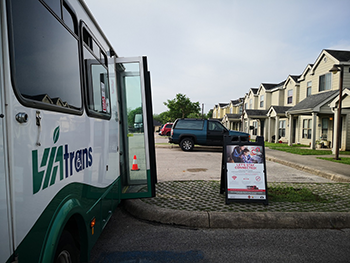USDOT-FTA and HUD-PIH Partnership for COVID-19 Recovery

The COVID-19 public health emergency prompted the transit industry to reimagine how it delivers essential services. Transit agencies across America answered the call in many ways: delivering meals, providing special service for older adults to access grocery stores and parking Wi-Fi-enabled buses in communities that lack access to the internet to support remote learning.
FTA partnered with HUD’s Office of Public and Indian Housing on an educational campaign to jointly support access to transportation, educational support services, and food, medical appointments and other essential services.
FTA and HUD co-hosted a webinar and listening session on Friday, November 13, 2020 with leadership from the FTA, PIH, transit agencies, and the Housing Authority of the City of Austin, to share information on value-added services and partnerships developing across the country.
Eligibility
FTA support, including funding available under the Coronavirus Aid, Relief, and Economic Security (CARES) Act, may be used to support essential services, provided certain conditions are met. FTA’s policy on incidental use allows for all FTA-funded vehicles, regardless of funding program, to be used to support essential services when they do not interfere with transit service. See the Partnership fact sheet.
Get Involved
FTA’s public transportation grantees, Public Housing Authorities, Tribally Designated Housing Entities and tribes are encouraged to:
- Create local partnerships to develop strategies to provide critical and essential services for community members, such as transportation to essential services and providing nontraditional services such as meal and grocery delivery.
- Identify opportunities to align public transportation funded assets, e.g., Wi-Fi enabled vehicles, routes, bus stops, etc. with community needs during the public health emergency and beyond.
- Identify opportunities to leverage federal funding from Coordinating Council on Access and Mobility (CCAM) agencies to meet community needs resulting from the public health emergency.
- Share data to assess excess capacity, gaps in services and community needs.
Resources
- DOT-FTA, HUD-PIH Partnership for COVID-19 Recovery Fact Sheet
- List of transit public transportation agencies and State Departments of Transportation
- Public Housing Authorities
- Tribes/Tribally Designated Housing Entities
- National Transit Database transit agency profiles
- National Center for Mobility Management (NCMM)
- NCMM is an FTA-funded national technical assistance center that can connect public housing authorities to their local public transportation provider(s). See NCMM regional liaisons
